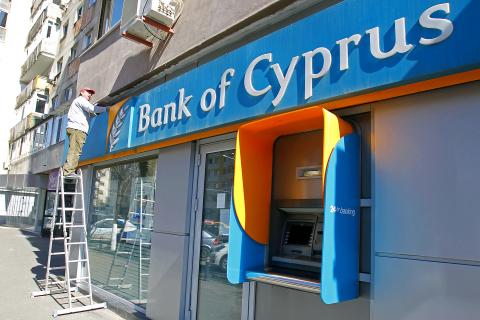Cyprus plans to lift a ban on casinos and offer firms tax exemptions on profits reinvested on the island under a package of reforms to kickstart its ailing economy, Cypriot President Nicos Anastasiades said on Monday.
The country’s EU partners agreed on a 10 billion euro (US$12.8 billion US$12.8 billion) rescue package on Monday last week after tense negotiations showed that the currency union’s crisis is far from over.
The tough terms of the deal look set to deepen the island’s recession, shrink its banking sector and lead to thousands of job losses, while the capital controls to prevent a run on Cypriot banks may test the ties that bind the euro bloc together.

Photo: Reuters
Anastasiades, who briefed ministers on the economy at an informal meeting on Monday, said the 12-point growth plan would be put to the Cypriot Cabinet for approval within the next 15 days.
The program includes measures to attract foreign investment to the island — a hub for offshore finance — as well as tax exemptions on business profits reinvested there, and the easing of payment terms and interest rates on loans.
In a bid to attract more tourists to the south of the island, Nicosia also hopes to lift a ban on casinos, which only operate legally in Turkish-controlled northern Cyprus.
Cyprus’ bailout is the first to impose losses on depositors. Those with more than 100,000 euros in Bank of Cyprus accounts are to lose about 60 percent of their savings.
Asked to predict the depth of the recession, Cypriot government spokesman Christos Stylianides said: “It’s not possible at this time to put numbers on the recession.”
“The government, having inherited an atomic bomb, tried to deactivate it and in doing so spared this country from total bankruptcy. It is now dealing with a post-earthquake period with the aim to kickstart the economy,” he added.

A wave of stop-loss selling and panic selling hit Taiwan's stock market at its opening today, with the weighted index plunging 2,086 points — a drop of more than 9.7 percent — marking the largest intraday point and percentage loss on record. The index bottomed out at 19,212.02, while futures were locked limit-down, with more than 1,000 stocks hitting their daily drop limit. Three heavyweight stocks — Taiwan Semiconductor Manufacturing Co (TSMC, 台積電), Hon Hai Precision Industry Co (Foxconn, 鴻海精密) and MediaTek (聯發科) — hit their limit-down prices as soon as the market opened, falling to NT$848 (US$25.54), NT$138.5 and NT$1,295 respectively. TSMC's

SELL-OFF: Investors expect tariff-driven volatility as the local boarse reopens today, while analysts say government support and solid fundamentals would steady sentiment Local investors are bracing for a sharp market downturn today as the nation’s financial markets resume trading following a two-day closure for national holidays before the weekend, with sentiment rattled by US President Donald Trump’s sweeping tariff announcement. Trump’s unveiling of new “reciprocal tariffs” on Wednesday triggered a sell-off in global markets, with the FTSE Taiwan Index Futures — a benchmark for Taiwanese equities traded in Singapore — tumbling 9.2 percent over the past two sessions. Meanwhile, the American depositary receipts (ADRs) of Taiwan Semiconductor Manufacturing Co (TSMC, 台積電), the most heavily weighted stock on the TAIEX, plunged 13.8 percent in

In a small town in Paraguay, a showdown is brewing between traditional producers of yerba mate, a bitter herbal tea popular across South America, and miners of a shinier treasure: gold. A rush for the precious metal is pitting mate growers and indigenous groups against the expanding operations of small-scale miners who, until recently, were their neighbors, not nemeses. “They [the miners] have destroyed everything... The canals, springs, swamps,” said Vidal Britez, president of the Yerba Mate Producers’ Association of the town of Paso Yobai, about 210km east of capital Asuncion. “You can see the pollution from the dead fish.

ASML Holding NV, the sole producer of the most advanced machines used in semiconductor manufacturing, said geopolitical tensions are harming innovation a day after US President Donald Trump levied massive tariffs that promise to disrupt trade flows across the entire world. “Our industry has been built basically on the ability of people to work together, to innovate together,” ASML chief executive officer Christophe Fouquet said in a recorded message at a Thursday industry event in the Netherlands. Export controls and increasing geopolitical tensions challenge that collaboration, he said, without specifically addressing the new US tariffs. Tech executives in the EU, which is